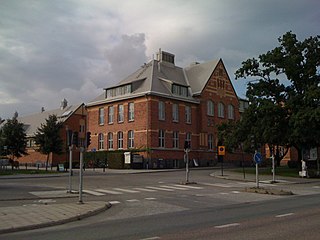The planetary phase of civilization is a term created by the Global Scenario Group (GSG) to describe the contemporary era in which increasing global interdependence and risks are binding the world into a unitary socio-ecological system. Characteristics of this phase include economic globalization, biospheric destabilization, mass migration, new global institutions, the Internet, new forms of transboundary conflict, and shifts in culture and consciousness.
The notion of the planetary phase of civilization derives from the work of the Global Scenario Group, an international and interdisciplinary body convened in 1995 to examine alternative long-range futures. The GSG synthesized its findings for a non-technical audience in the essay Great Transition: The Promise and Lure of the Times Ahead. [1]
According to the GSG, the planetary phase of civilization is the third significant transition in civilization, following the shift from Stone Age culture to Early Civilization, and from Early Civilization to the Modern Era. The planetary phase sees social organization, the economy, and communications move to the global level. Some argue that it constitutes a new geologic era, the Anthropocene, in which human activity becomes the dominant driver of changes to the Earth system.
The GSG argued that historical transitions have been accelerating. Thus, the duration of the Stone Age was on the order of 100,000 years; Early Civilization, 10,000; and Modernity, 1,000. If the planetary phase takes shape over 100 years, the pattern would continue.
The GSG groups the possibilities for how the planetary phase could unfold into three broad scenario types: Conventional Worlds, Barbarization, and Great Transitions. Conventional Worlds assume the persistence of currently dominant institutions and cultural values, and Barbarization scenarios are marked by social devolution. Great Transition futures, by contrast, incorporate new institutions rooted in the ascendance of a new suite of values – solidarity, ecological stewardship, well-being – powered by the emergence of a global citizens movement as a potential actor to counter the power of transnational corporations, state governments, and mainstream values.
The Anthropocene is a proposed geological epoch dating from the commencement of significant human impact on Earth's geology and ecosystems, including, but not limited to, anthropogenic climate change.

Futures studies, futures research, futurism or futurology is the systematic, interdisciplinary and holistic study of social and technological advancement, and other environmental trends; often for the purpose of exploring how people will live and work in the future. Predictive techniques, such as forecasting, can be applied, but contemporary futures studies scholars emphasize the importance of systematically exploring alternatives. In general, it can be considered as a branch of the social sciences and an extension to the field of history. Futures studies seeks to understand what is likely to continue and what could plausibly change. Part of the discipline thus seeks a systematic and pattern-based understanding of past and present, and to explore the possibility of future events and trends.

Global change in broad sense refers to planetary-scale changes in the Earth system. It is most commonly use to encompass the variety of changes connected to the rapid increase in human activities which started around mid-20th century, i.e. the Great Acceleration. While the concept stems from research on the climate change, it is used to adopt a more holistic view on the observed changes. Global change refers to the changes of the Earth system, treated in its entirety with interacting physicochemical and biological components as well as the impact human societies have on the components and vice versa. Therefore, the changes are studied through means of Earth system science.
This timeline lists events in the external environment that have influenced events in human history. This timeline is for use with the article on environmental determinism. For the history of humanity's influence on the environment, and humanity's perspective on this influence, see timeline of history of environmentalism. See List of periods and events in climate history for a timeline list focused on climate.
The Global Scenario Group (GSG) was an international, interdisciplinary body convened in 1995 by the Tellus Institute and the Stockholm Environment Institute (SEI) to develop scenarios for world development in the twenty-first century. Further development of the Great Transition scenarios has been carried on by the Great Transition Initiative (GTI).
Backcasting is a planning method that starts with defining a desirable future and then works backwards to identify policies and programs that will connect that specified future to the present. The fundamentals of the method were outlined by John B. Robinson from the University of Waterloo in 1990. The fundamental question of backcasting asks: "if we want to attain a certain goal, what actions must be taken to get there?"

The Tellus Institute is an American non-profit organization established in 1976 with the aim of bringing scientific rigor and systemic vision to critical environmental and social issues. Tellus has conducted thousands of projects throughout the world, and now focuses on the global future and how to shape it.

Paul Raskin is the founding President of the Tellus Institute, which has conducted over 3,500 research and policy projects throughout the world on environmental issues, resource planning, scenario analysis, and sustainable development. His research and writing has centered on propagating the Great Transition. Raskin has served as a lead author on a number of high-profile international reports, including the U.S. National Academy of Science's Board on Sustainability, the Millennium Ecosystem Assessment, the United Nations Environment Programme's Global Environment Outlook, the Earth Charter, and the Intergovernmental Panel on Climate Change (IPCC) Third Assessment Report.
Great Transition is used by the Great Transition Initiative and its predecessor, the Global Scenario Group (GSG), to describe a vision of a just and sustainable global future. The term was originally coined by Kenneth E. Boulding in The Meaning of the 20th Century – The Great Transition (1964) and describes the shift from pre-modern to post-modern culture, and the four possible courses of action that these organizations believe will allow humanity to successfully manage the Great Transition.

Sustainability is a societal goal that relates to the ability of people to safely co-exist on Earth over a long time. Specific definitions of sustainability are difficult to agree on and have varied with literature, context, and time. Sustainability is commonly described as having three dimensions : environmental, economic, and social. Many publications state that the environmental dimension is the most important. For this reason, in everyday use, "sustainability" is often focused on countering major environmental problems, such as climate change, loss of biodiversity, loss of ecosystem services, land degradation, and air and water pollution. The concept of sustainability can be used to guide decisions at the global, national, and individual levels.

The Potsdam Institute for Climate Impact Research is a German government-funded research institute addressing crucial scientific questions in the fields of global change, climate impacts, and sustainable development. Ranked among the top environmental think tanks worldwide, it is one of the leading research institutions and part of a global network of scientific and academic institutions working on questions of global environmental change. It is a member of the Leibniz Association, whose institutions perform research on subjects of high relevance to society.

The Earth System Governance Project is a long-term, interdisciplinary social science research programme originally developed under the auspices of the International Human Dimensions Programme on Global Environmental Change. It started in January 2009.

Planetary boundaries is a concept highlighting human-caused perturbations of Earth systems making them relevant in a way not accommodated by the environmental boundaries separating the three ages within the Holocene epoch. Crossing a planetary boundary comes at the risk of abrupt environmental change. The framework is based on scientific evidence that human actions, especially those of industrialized societies since the Industrial Revolution, have become the main driver of global environmental change. According to the framework, "transgressing one or more planetary boundaries may be deleterious or even catastrophic due to the risk of crossing thresholds that will trigger non-linear, abrupt environmental change within continental-scale to planetary-scale systems."
The following outline is provided as an overview of and topical guide to futures studies:
Transition scenarios are descriptions of future states which combine a future image with an account of the changes that would need to occur to reach that future. These two elements are often created in a two-step process where the future image is created first (envisioning) followed by an exploration of the alternative pathways available to reach the future goal (backcasting). Both these processes can use participatory techniques where participants of varying backgrounds and interests are provided with an open and supportive group environment to discuss different contributing elements and actions.
The global citizens movement is a constellation of organized and overlapping citizens' groups seeking to foster global solidarity in policy and consciousness. The term is often used synonymously with the anti-globalization movement or the global justice movement.

Post-growth is stance on economic growth concerning the limits-to-growth dilemma — recognition that, on a planet of finite material resources, extractive economies and populations cannot grow infinitely. The term "post-growth" acknowledges that economic growth can generate beneficial effects up to a point, but beyond that point it is necessary to look for other indicators and techniques to increase human wellbeing.
Planetary health refers to "the health of human civilization and the state of the natural systems on which it depends". In 2015, the Rockefeller Foundation and The Lancet launched the concept as the Rockefeller Foundation–Lancet Commission on Planetary Health.

The Stockholm Resilience Centre (SRC), is a research centre on resilience and sustainability science at Stockholm University. It is a joint initiative between Stockholm University and the Beijer Institute of Ecological Economics at the Royal Swedish Academy of Sciences.